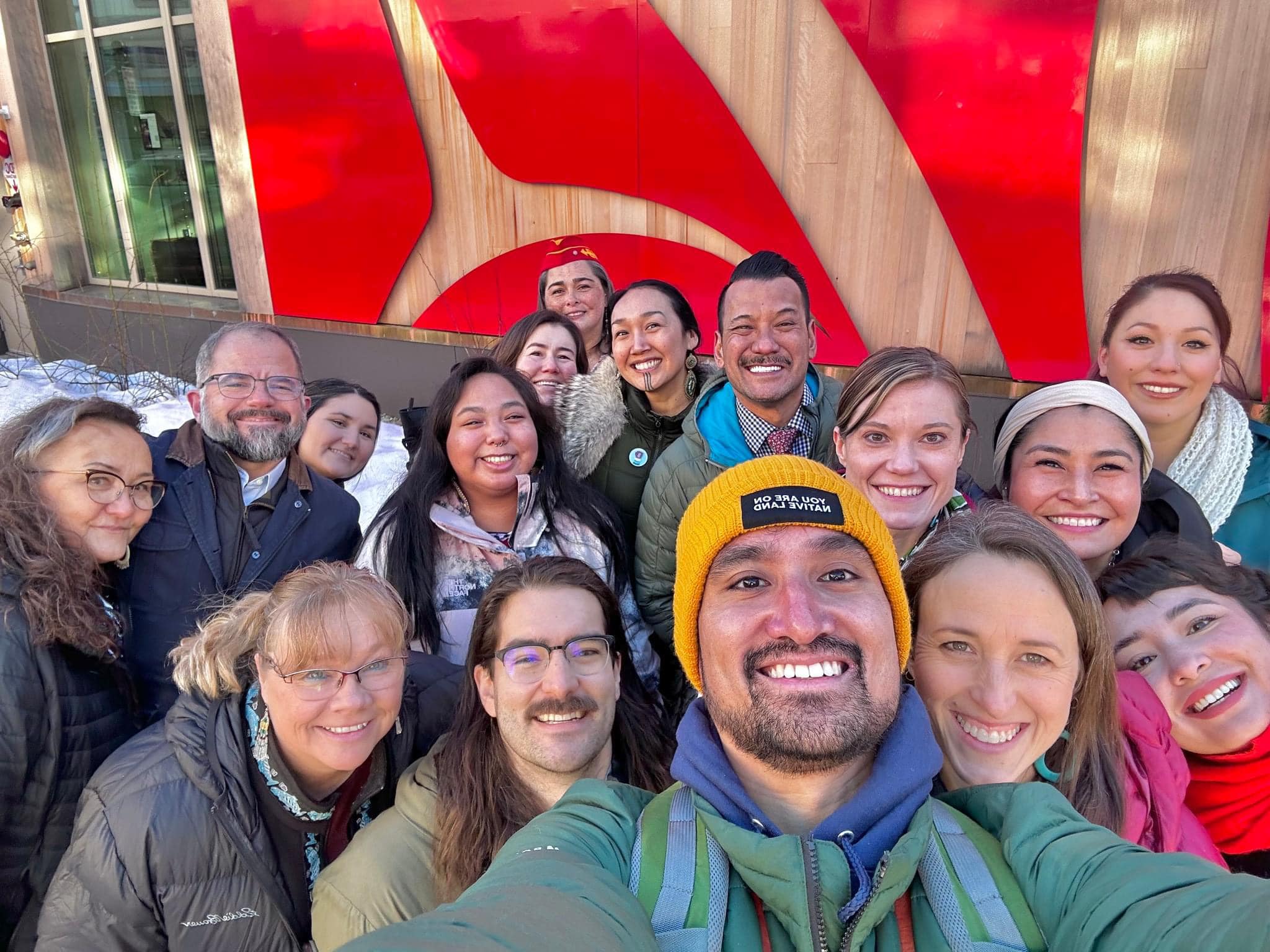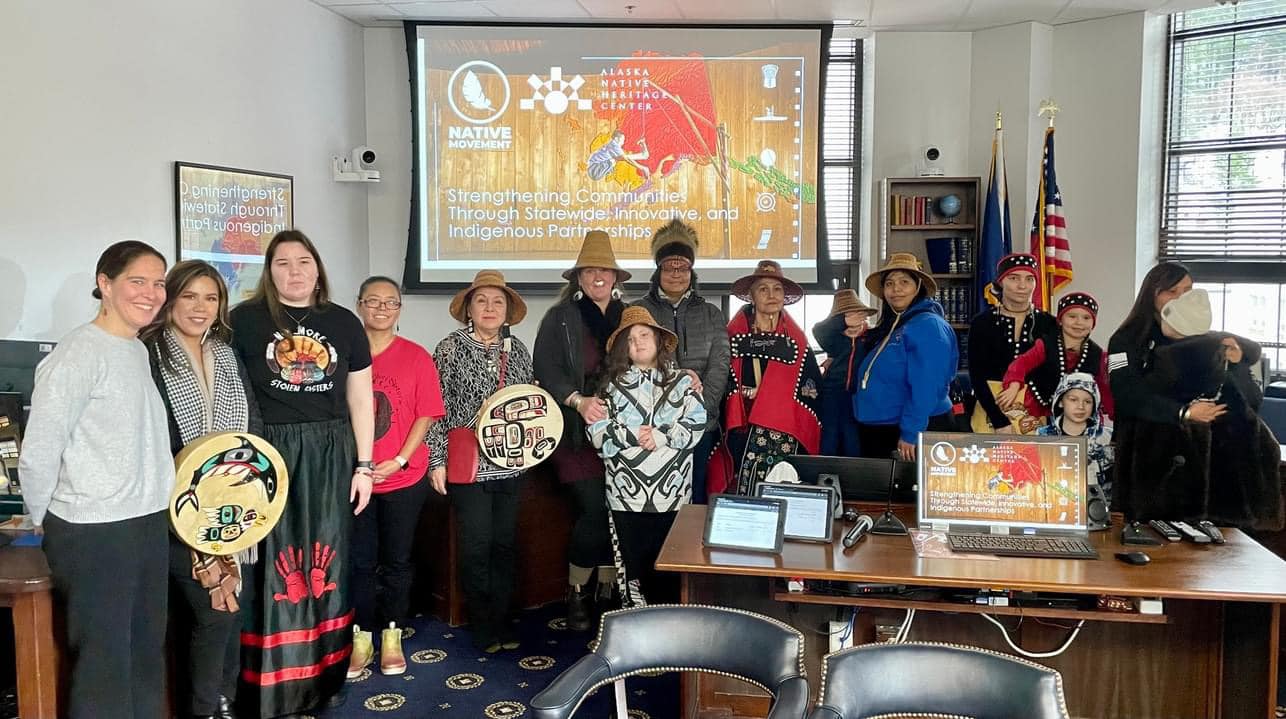Our Journey to Educate & Inform Alaska Policy Makers on MMIP, Public Safety, and Tribal Justice
The MMIWG2S Alaska Working Group and Tribal Leaders Travel to Alaska’s Capital

Everyone has a right to be free from violence in their own homes and communities, no matter where we live. It is far past time that policies and budgets reflect the needs of the communities and properly address the issues we face across our state and nation. We need to focus on ensuring every community has public safety. Prevention must be a part of the solution for safer communities. Offenders who commit violent acts are held accountable, and there is healing from generational trauma. This all must be done together to properly address all the underlying issues of violence to make real change.
Here is what we know with the limited data we have on MMIP, human trafficking, domestic violence, and sexual assault: There is underreporting as a result of failed responses and support for victims. Murder is the third leading cause of death among American Indian/Alaska Native Women (AI/AN), and more than 80% of AI/AN women have experienced violence in their lifetimes. In the United States, for example, 84% of AI/AN women and 82% of AI/AN men reported experiencing violent victimization in their lifetime. Studies have also shown that Native American children are more likely to experience abuse and trauma than their non-Native peers. Alaska Native women have reported rates of domestic violence up to 10 times higher than in the rest of the United States. The Indian Law Resource Center has been highlighting this critical issue for AI/AN and Native Hawaiian women who experience domestic violence.
Important questions we should all be asking: How are we addressing the crisis of missing and murdered Indigenous people? How are we making changes so public safety is available to everyone in Alaska and nationwide? How are we addressing the trauma and harm inflicted on our people and in our communities so that all our people can heal? How are we providing services for survivors to ensure they have a safe place to live, food security, and supportive systems to move forward in a positive way away from abuse? How are we addressing and providing services for those who are perpetrators, who are also dealing with their own trauma and harm, in addition to holding them accountable for their actions? How are the state and federal governments partnering with our Tribes and communities to approach change as partners?
Many of us within the Alaska Native Community have taken actions on our own to push policymakers to take a serious look at the MMIP crisis and all the intersecting issues of human/sex trafficking, domestic violence, and sexual assault, and the severe lack of public safety and extremely low prosecution rates for those inflicting harm. We want to uplift all those Tribes, non-profits, and individuals who work in their communities and others to shed light and take action on MMIP. We also want to share some of our work to help inspire and inform.
In February 2024, five Alaska Native non-profits, who collectively work together in The Alaska Missing and Murdered Indigenous Womxn, Girls, and Two-Spirit (MMIWG2S) Working Group, and Tribal Leaders from across the state traveled to Dzantik’i Héeni (Juneau), Alaska during the state legislative session to educate and bring attention to MMIP, high rates of domestic violence and sexual assault, lack of public safety and the need to support and understand Tribal justice systems.
To start our education journey with policymakers, we entered the Alaska State capitol building in traditional regalia, dancing and singing to the beat of the drums that rang through the capitol building; our voices were powerful, singing traditional Tlingit, Haida, and Tshimshian songs. This began our three days of presentations and meetings with policymakers on the current status of the crisis of Missing and Murdered Indigenous Peoples (MMIP) in Alaska, the lack of public safety throughout the state, and information sharing about our Tribal justice systems.
There were many memorable aspects to this fly-in to highlight, including the three lunch and learn presentations attended by legislators, legislative staff, commissioners, and community members; two presentations to the House Tribal Affairs Committee; an opportunity to present and testify for the Senate State Affairs Committee for Senate Bill 151: Missing and Murdered Indigenous People, which includes some important policy goals the working group has been advocating for years that will take steps forward to end MMIP; and individual meetings with 90% of legislators and their staff. Some of the most memorable pieces came forward as personal stories—some never shared before, stories of our loved ones who have gone missing and been murdered, and the personal connections we shared and connections made with policymakers who are starting to see some of the unfortunate real aspects of Alaska that far too many people have experienced violence or have family and friends going through these terrible experiences.
“Even though it is difficult, we must share our stories to make change in our state and protect our children,” said Tami Truett Jerue (citizen of the Anvik Tribe), Executive Director of the Alaska Native Women’s Resource Center. “We will continue to stand up, educate, and be the voice our ancestors taught us to use - we cannot continue to let the MMIP crisis, domestic violence, and sexual assault continue, and we must hold our state and federal leaders accountable to their responsibility to take care of our citizens, especially our rural citizens who have been severely lacking basic rights such as public safety.”
As we came to the end of our three days, during our last presentation in the House Tribal Affairs Committee discussing Tribal Justice, higher rates of violence against Alaska Native people, and lack of law enforcement in rural Alaska, we also learned through an unfortunate example of truly not understanding the disproportionate impacts of violence on Alaska Native and American Indian people through comments from a Representative that were implying Alaska Native organizations and people were not taking care of our white sisters and brothers, only showing that we continue to face an uphill battle as misunderstanding the unique obstacles that Alaska Native and rural communities face. Additionally, we have made it clear that no matter what we do to improve public safety for Indigenous people, it increases safety for everyone and that we do not turn away anyone who needs assistance and protection. Through expressions of white fragility, it was made clear how much more work is required to recognize the pervasive notions of racism that lead to violence. When we come together on this issue, we must demand that true justice accounts for those impacted the most and where the largest gap is. For allies who care deeply about missing persons, homicides, and human trafficking, the initiatives and solutions we put forward must fill that gap of disproportionality to ensure equity and real change.
We must recognize the historic actions over the last couple of years that would not have happened without being a loud voice to our Governor and Commissioners and coming together as partners to advocate and educate. We have helped move actions forward to create the first MMIP Investigative Unit at the Department of Public Safety (DPS), where they now employ four full-time MMIP Investigators, one full-time Assistant Attorney General specializing in MMIP, and a state MMIP Commission/Working Group within DPS. Additionally, we have started making headway on implementing and re-invigorating cultural training at DPS for every trooper and village public safety officer, with input from the Alaska Native Community and moving toward a requirement of training to be conducted by the Indigenous community and an education campaign related to MMIP.
This legislative session, there are multiple bills addressing some of our MMIP policy goals, which are included in SB151 and HB234: Missing and Murdered Indigenous People, and HB235: Mandatory Reporting to the Federal Missing Persons Database, which will continue to support the efforts through funding and actions to address the MMIP crisis in Alaska.
As policies and budgets are discussed, we continue to advocate for strengthening partnerships between Tribes, Native organizations, and the federal and state governments. We have worked hard to create more bonds within our circles to ensure that Alaska’s missing and murdered Indigenous peoples are not forgotten and this crisis ends. We can and must all work together to secure fundamental human rights for all Alaskans. Together, we can create solutions to ensure a safer Alaska for all.






